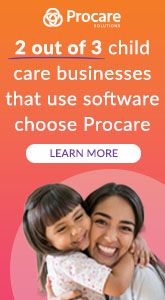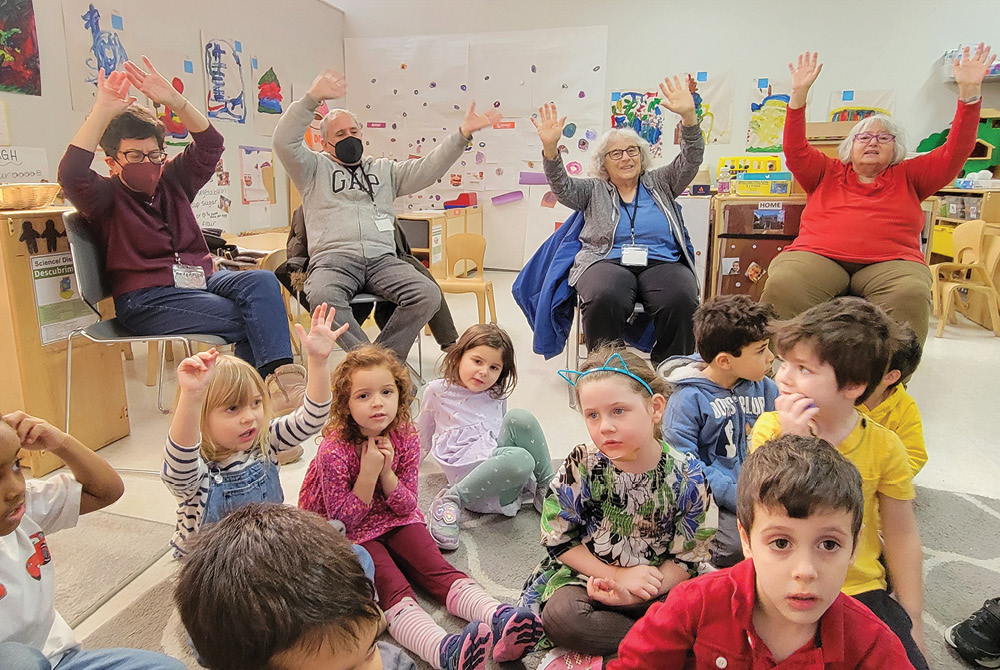Did you know that music-making in early childhood naturally fosters important social and emotional skills, such as self-regulation, self-confidence, leadership,, and empathy? In fact, most early childhood experts see positive social skills as the most important skills for school readiness and later school success. Music is a great way for young children to learn and practice these skills, which can impact their overall development and learning. And the best part? You don’t have to have a great singing voice or play a musical instrument to have an impact. What’s most important isn’t how well you make music with the children in your classes, but that you make music with them – as much as possible!
Music Activity Ideas For Your Classrooms
How can you use music to support social-emotional learning? Here are some activities you can try in your classrooms:
Self-confidence and Leadership Skills
Many children’s songs are great substitution songs, where the lyrics can be changed to reflect new ideas. Experiencing the whole class using their idea for a new word, movement, or sound, can be profoundly validating and empowering for a young child, which supports their developing self-confidence and leadership skills.
Some substitution songs you can use:
- “One Little Owl,” Music Together Family Favorites 1
- Children can choose an animal to put in the tree, and, depending on their age, also provide a movement and sound that reflect how that animal moves and sounds.
- We Are the Dinosaurs,” The Laurie Berkner Band
- Children can suggest other things the dinosaurs can do.
- “Wiggle,” Music Together Family Favorites 2
- Children can suggest a new way to move and you can sing that instead of “wiggle” (e.g., jumping, stretching, spinning, etc.).
Self-regulation and Impulse Control
Think of the popular backyard game “Red Light, Green Light!” In that game, children are allowed to experience what it feels like to resist doing something as they move on the “green light” and freeze on the “red light.” To support impulse control and self-regulation in your classroom using music, try the following activities:
- Incrementally leaving out a phrase or word in a song (while “singing” it silently in your mind) is a fun way for children to practice the crucial skill of impulse control.
- You can try this technique with any song you and your children know, but two fun ones are “B-I-N-G-O” and “A Ram Sam Sam.”
- Put on literally any song and invite children to dance as the music plays. Press pause at any time, and once the music stops, ask the children to freeze in dancing positions. Resume playing and repeat!
- Songs that change tempo (e.g., they get faster and slower) are great for supporting self-regulation and self-control.
- Try “Don Alfredo Baila” (from Music Together Family Favorites 1) and “Baby Shark” (if you can handle it on repeat!).
- Lullabies and slower-tempo songs also support self-regulation.
Social Skills and Empathy
Respect, collaboration, and working as a team are all important social skills for children to develop. Group movement and music-making activities naturally challenge children to work with others as an ensemble. They learn the importance of respecting others’ space and ways of expression. They also get to practice working together towards a common goal (e.g., when holding hands while dancing).
In addition to dancing together, try some instrument “play-along” activities, where every child gets a child-safe instrument (e.g., egg shakers, rhythm sticks) to play along with the music as a group. “Foolin’ Around”, “Goin’ for Coffee”, and “Playin’ in the Kitchen” from the Music Together Family Favorites collections are all great songs for instrument jams!
Making music in a group also challenges children to watch the people around them for subtle cues to timing, volume, and expressiveness; These are the same cues that we use for reading expressions and moods on people’s faces. Being able to perceive and understand people’s feelings is a basis for empathy and moral development.
What the Research Reveals about Music and Social-Emotional Learning
Actively making music with the children in your classes is a fun and easy way to support their socio-emotional learning—and that’s backed by research! Studies are continuing to reveal how engaging in group music and movement activities during the preschool years affects development in areas of group cohesion, cooperation, and prosocial behavior.
In fact, one study found that singing and dancing together led to increased empathy (i.e., the ability to understand and even share in the feelings of others) for the children with whom they were making music. Other studies have confirmed and reinforced these findings, showing how participation in group music activity during the preschool years impacts children’s social-emotional development and learning, including helping, sharing, and comforting behaviors.
So, the next time you have music time in class, try some of the activities suggested here. And remember, it doesn’t matter whether or not you consider yourself musical. Your joyful participation and enjoyment is what is most important!
References:
Ilari, B., Helfter, S., & Huynh, T. (2020). Associations Between Musical Participation and Young Children’s Prosocial Behaviors. Journal of Research in Music Education, 67(4), 399-412. https://doi.org/10.1177/0022429419878169
Kirschner, S. & Tomasello, M. (2010). Joint music-making promotes prosocial behavior in 4-year-old children. Evolution and Human Behavior, 31, 354-364. https://doi.org/10.1016/i.evolhumbehav.2010.04.004
Ma, X., Xiong, S.-Q., Zhang, X.-Y., Hu, Q.-J., Li, S., & Tao, Y.-C. (2024). Influence of musical activities on the prosocial behaviors of preschool children. Psychology of Music, 52(5), 595-607. https://doi.org/10.1177/03057356231213800
Lauren Guilmartin, M.A., is the director of early learning at Music Together Worldwide, where she oversees the in-school and research departments. Guilmartin manages projects using variations of the Music Together curriculum in a wide variety of early care, education, early intervention and outreach settings. She frequently presents at education conferences in the U.S. and abroad. Guilmartin earned her master's in developmental psychology at Teachers College, Columbia University, with a focus in early childhood development and education, and her bachelor's degree from Brown University.
Related
ADVERTISEMENT











